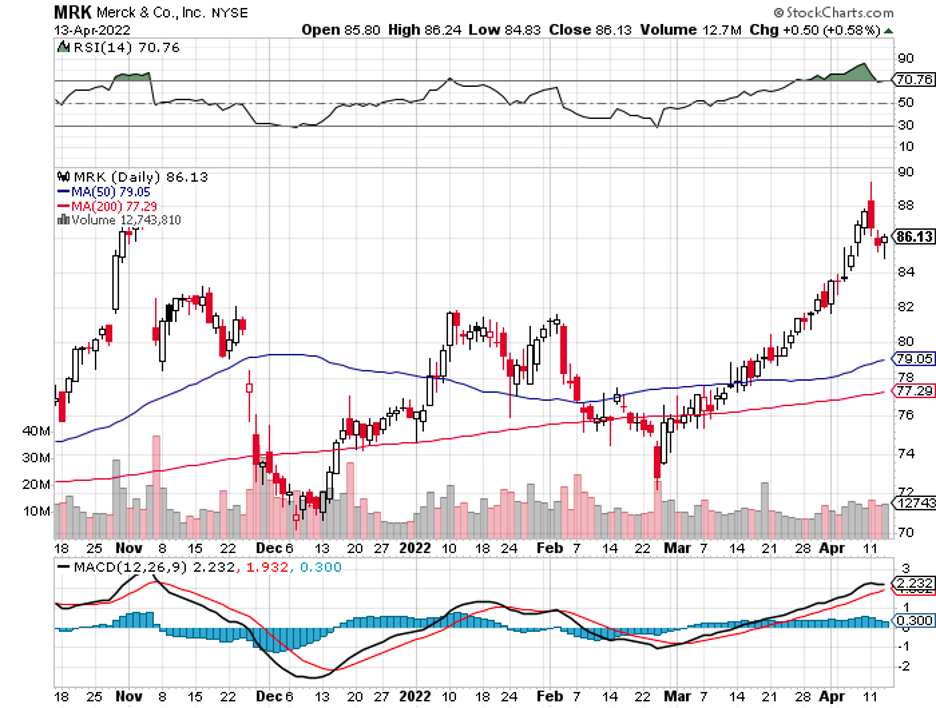A Biopharma Stock Bent on Redemption
It looks like we’re about to bear witness to a redemption journey.
Once upon a time, Merck (MRK) was a major player in the cardiovascular sector. Over the years, it has gradually diminished to a minor league name.
However, Merck has plans to reverse this fortune and reclaim its dominance in the cardio market. To date, it has eight new drug approvals and a slew of expanded labels queued in the next couple of years.
This decision is evident in Merck’s move to outbid Bristol Myers Squibb (BMY) in the auction for Acceleron Pharma, shelling out a whopping $11.5 billion to boost its cardio pipeline considerably.
While the deal may seem like a massive risk, Merck is confident that this deal holds the potential to open up the path to single-product peak sales reaching $10 billion by the mid-2030s.
In fact, there’s no need to wait for long to see some solid proof of Merck’s multibillion-dollar bet, as Acceleron already has a candidate set to be put on display by the end of 2022 or early 2023.
This Acceleron acquisition forms part of the “New Merck” touted when the company welcomed a new CEO and came on the heels of the success of the leadership that brought the mega-blockbuster cancer drug Keytruda.
It also signifies Merck’s conscious efforts to ease their heavily criticized over-dependence on Keytruda.
While the drug will lose patent protection after 2028, Keytruda still holds a significant portion of Merck’s sales. The treatment accounted for roughly 35% of the company’s total revenues last year.
The patent loss of a significant moneymaker is a typical problem for virtually every Big Pharma company, with AbbVie (ABBV) and Bristol Myers Squibb coming to mind as the most recent examples.
The go-to solution to this is pursuing mega-money mergers: AbbVie acquired Allergan for $63 billion while Bristol splurged on Celgene at $74 billion.
This quickly bolsters the existing pipelines and portfolios of the companies and assuages the fear of investors over impending revenue losses.
Instead of following this pattern, Merck did the opposite in 2021.
The company decided to downsize and established a spinoff segment: Organon (ORGN). The idea is to offload its biosimilars and other legacy products to focus on its core strengths.
This is reminiscent of Pfizer’s (PFE) move to spin out its Upjohn unit and merge it with Mylan to form Viatris (VTRS).
This move looks to have worked well for Merck and Organon as it allowed the parent company to focus on its blockbuster brands.
For instance, Bridion recorded a 28% year-over-year rise in 2021 to reach $1.53 billion in sales, while ProQuad reported a 14% increase to hit $2.14 billion.
Meanwhile, Gardasil rose to an impressive 44% to contribute $5.7 billion.
Even Merck’s Animal Health sector grew by 18% to record $5.6 billion.
There’s also Keytruda, which is projected to become the highest-selling drug at $24.3 billion by 2026.
These are only some of the blockbuster products in Merck’s portfolio expected to continue increasing revenues this 2022.
In addition, the company expects at least $5 billion from its COVID-19 antiviral drug Molnupiravir.
Looking at the trajectory and growth of the pipeline and existing programs, Merck estimates an additional 17% increase in its year-on-year revenue in 2022 to reach $56.1 billion to $57.6 billion.
Despite the move to establish a spinoff unit, the Acceleron deal hints at the possibility that Merck might be shifting to an open checkbook strategy.
Considering how relentlessly it pursued the deal, there’s a chance that the company would be at the bargaining table for a while in search of ways to protect itself against the pending Keytruda patent loss.
Some contenders for a potentially splashy offer from Merck are Moderna (MRNA) and BioNTech (BNTX), which could bolster the bigger company’s mRNA pipeline.
It can also splurge on gene therapy experts by targeting CRISPR Therapeutics (CRSP) and even Vertex (VRTX).
However, given bluebird bio’s (BLUE) flailing performance as of late, this small biotech could very well be a contender for a bargain deal.
Speaking of discounted stocks, Biogen (BIIB) is also reportedly under consideration simply because of its deeply discounted price following its disastrous Alzheimer’s disease program.
Whatever move it makes, one thing is sure: Merck, with its $208 billion market capitalization, is in a healthy and stable place financially.
More importantly, it has an excellent product portfolio and an exciting pipeline.
It has shown remarkable growth in the past years and impressive efforts to secure a great future, making it a solid stock to buy and hold for a long time.


